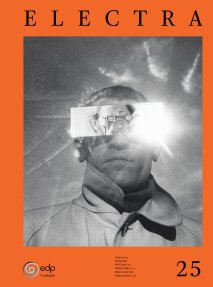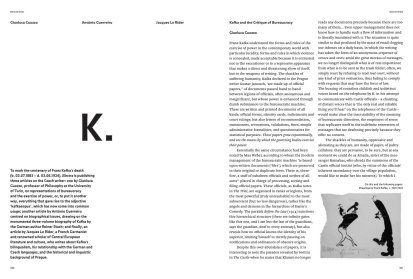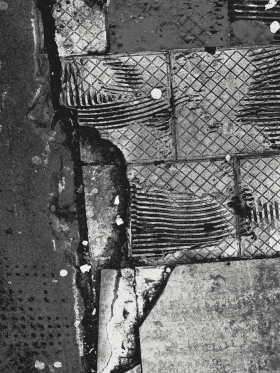The shackles of suffering humanity, Kafka declared to the Prague writer Gustav Janouch, ‘are made up of official papers,’1 of documents passed hand to hand between legions of officials, often anonymous and insignificant, but whose power is enhanced through dumb submission to the bureaucratic machine. These are written and printed documents of all kinds: official forms, identity cards, indictments and court rulings; but also letters of recommendation, summonses, revocations, validations, fines, simple administrative formalities, and questionnaires for statistical purposes. These papers grow exponentially, and are the means by which the governing bodies exercise their power.
Essentially the same circumstance had been noted by Max Weber, according to whom the modern management of the bureaucratic machine ‘is based upon written documents (‘files’), which are preserved in their original or duplicate form. There is, therefore, a staff of subaltern officials and scribes of all sorts’2 placed in charge of processing, sorting and filing official papers. These officials, as Kafka notes in The Trial, are organised in ranks or legions, from the most powerful (truly unreachable) to the most subservient (but no less dangerous), rather like the angels and demons in the hierarchies of Dante’s Comedy. The parable Before the Law (1914) sanctions this hierarchical structure (there are infinite gates like this one, and I am but the last of the guardians, says the guardian, deaf to every entreaty), but also reveals how no official knows the identity of his superior, limiting himself to merely passing on notifications and ordinances of obscure origins.
Despite this over-abundance of papers, it is interesting to note the paradox revealed by Sortini in The Castle when he states that Klamm no longer reads any documents precisely because there are too many of them... Even upper management does not know how to handle such a flow of information and is literally inundated with it. The situation is quite similar to that produced by the mass of email clogging our inboxes on a daily basis, in which the writing has taken the form of an anonymous sequence of zeroes and ones: amid the great morass of messages, we no longer distinguish what is of real importance from what is to be sent to the trash folder; often, we simply react by refusing to read tout court, without any kind of prior evaluation, thus failing to comply with requests that may have the force of law. The buzzing of countless childish and indistinct voices heard on the telephone by K. in his attempt to communicate with Castle officials – a chanting of distant voices that is ‘the only real and reliable thing you’ll hear’ on the telephones of the Castle – would make clear the inscrutability of the meaning of bureaucratic directives, the emptiness of sense that replicates itself in the indefinite reiteration of messages that are deafening precisely because they offer no content.
The shackles of humanity, oppressive and alienating as they are, are made of paper, of paltry cellulose: they are pervasive, to be sure, but at any moment we could do as Amalia, sister of the messenger Barnabas, who shreds the summons of the Castle official Sortini (who, by virtue of the officials’ inherent ascendancy over the village population, would like to make her his mistress). To which I would say the following, invoking a principle whose validity reaches far beyond Kafka’s literary world: never has power been so oppressive and pervasive, but never before has power so revealed its own fragility. In this sense, the servant girl Pepi tells K. that to free himself from the domination of the lords of the castle it would be enough to ‘set fire to the whole Herrenhof and burn it down, burn it to the ground, so that not a trace of it was left, burn it up like a piece of paper in the stove.’ Paper burns quickly and leaves little behind; everything disappears in a blaze: duties, obligations, sentences... A computer virus, today, could stand in for this incendiary device. But is this merely a deception? Is there some ineluctable element of reality or power behind the document, of greater resistance, a physical force like a Nietzschean power? It is hard to say; all sense of the origin of our subservience to paper has been lost, though our subjugation is clear and abiding.
We are in the midst of a paradox: violence seems to have disappeared from our lives, as David Graeber suggests;3 yet the law, in its perfect imbecility, weighs down on us like a boulder, exerting a highly sophisticated, unprecedented form of violence. According to Kafka, the law even inscribes itself into the human body, paralysing our lives. As Johannes Urzidil reminds us, Kafka’s work speaks of the inescapable mechanism of life, of the bureaucratic machinery that keeps man in ‘a state of perpetual preventive custody’;4 this infernal machine brings accusations whose substance and purpose are never fully known to the accused and forces him to confess to crimes he has never committed, inflicting on him refined and incomprehensible punishments and torture, the violence of which is barely perceptible. The power of bureaucracy, through its formidable weapons of paper, is to lock us in a state of perpetual inferiority, characterised by the deep sleep of reason; almost as if we were schoolchildren who feel guilty, obliged to ‘write down the same meaningless (in repetition, at least) sentence ten times, a hundred times or even oftener.’5 Günther Anders, in this regard, wrote that the condition of Kafka’s characters is that of being affected by the ‘“tetanus” of not advancing’6: they insist on the same situation, because time has ossified into writing, precluding – with its capacity for ad lib reiteration – any critical examination of the command received. In his stories it is as if the action was fixed by the figurative power of the written word, which takes on the appearance of a lapidary epigraph, of a sentence carved in the bare stone of an ossified history-nature. Under this leaden sky of incomprehensible and threatening words struggles man, abandoned by God, face to face with the pure form of the law, nomos without face or name. It resounds deafly and, like an implacable machine, writes, engraves and commands we know not what, while man himself becomes paper for its immaculate application and inscription. As happens in the short story A Dream (1914–1915), where Joseph K. witnesses the engraving of his name on his own tombstone, resigning himself to the inescapable: ‘Here lies… each letter came out clean and beautiful, deeply incised and in purest gold’; unable to react to this premeditated execution.






Share article